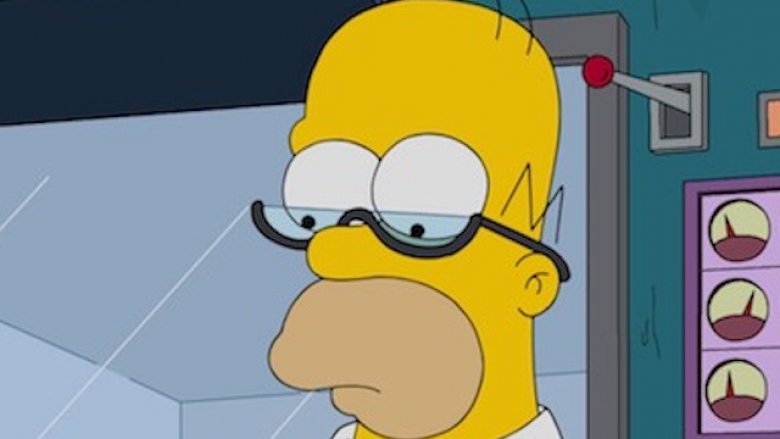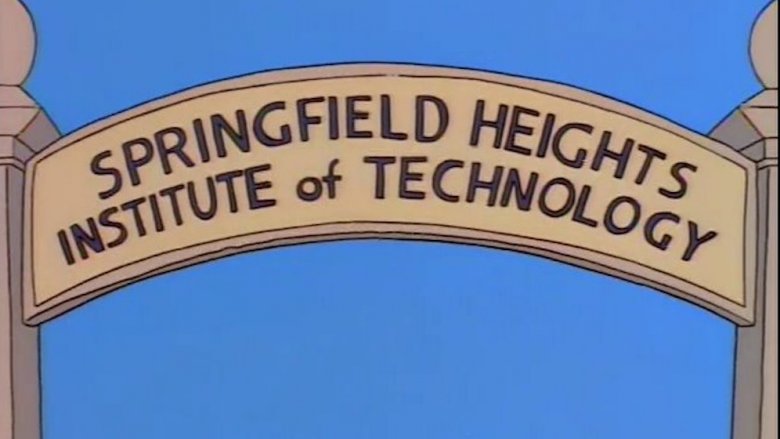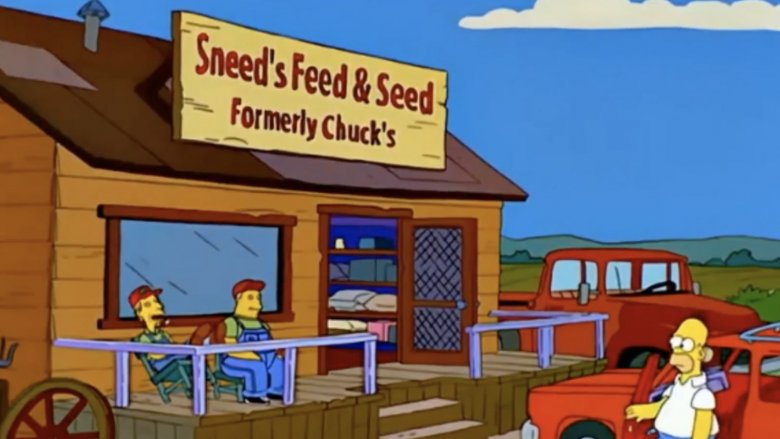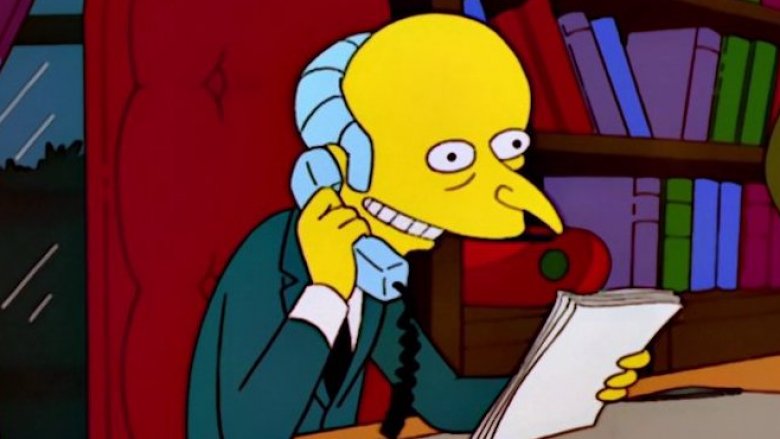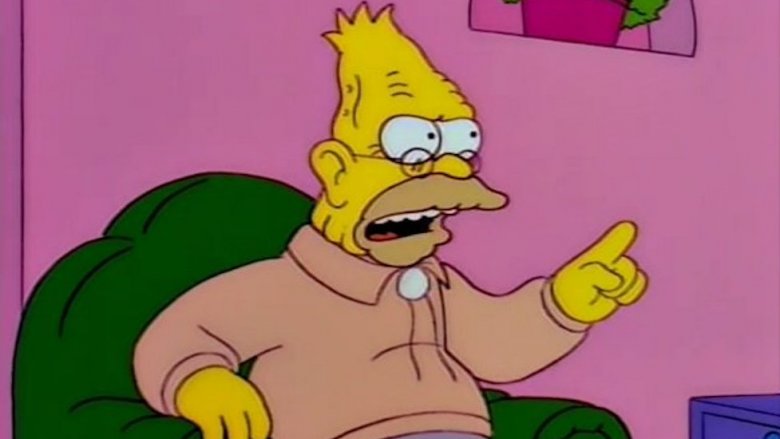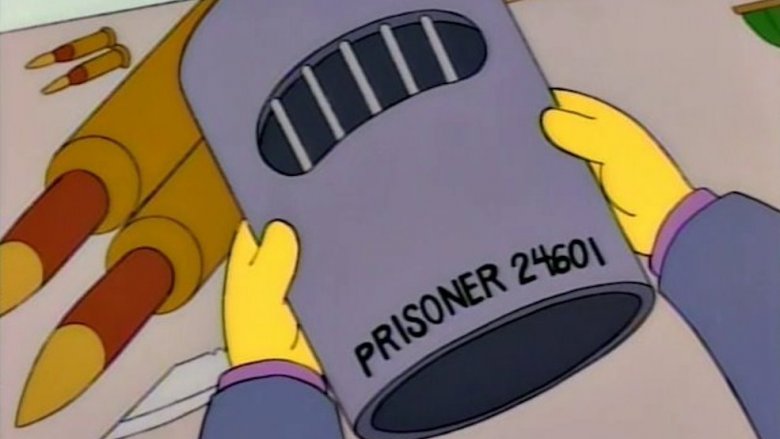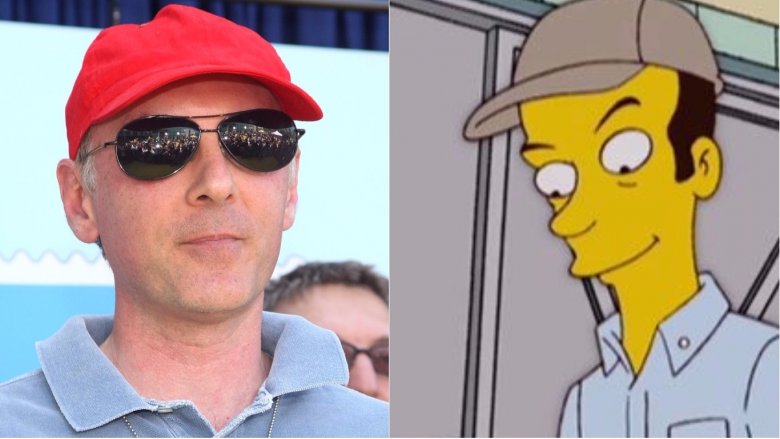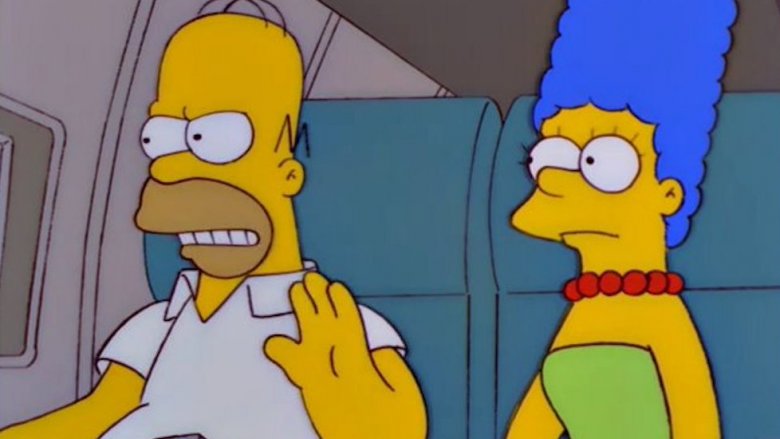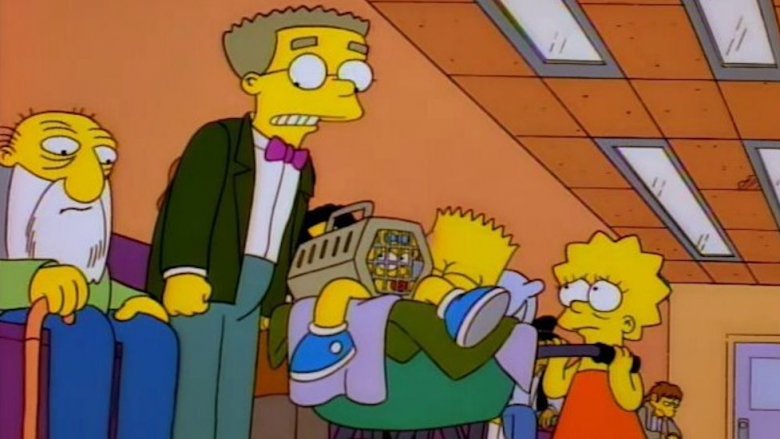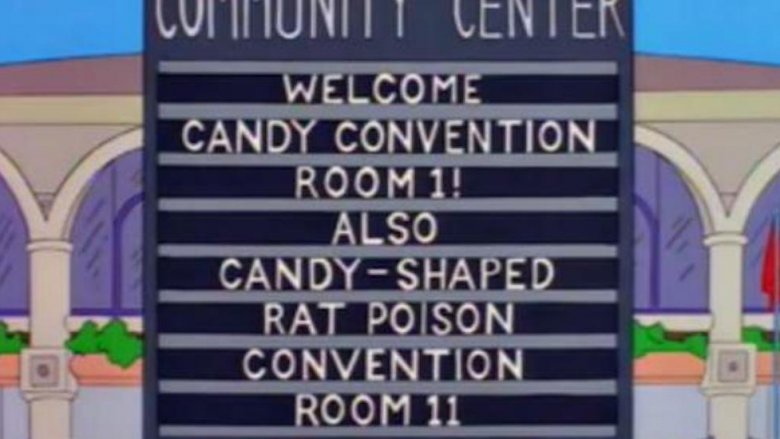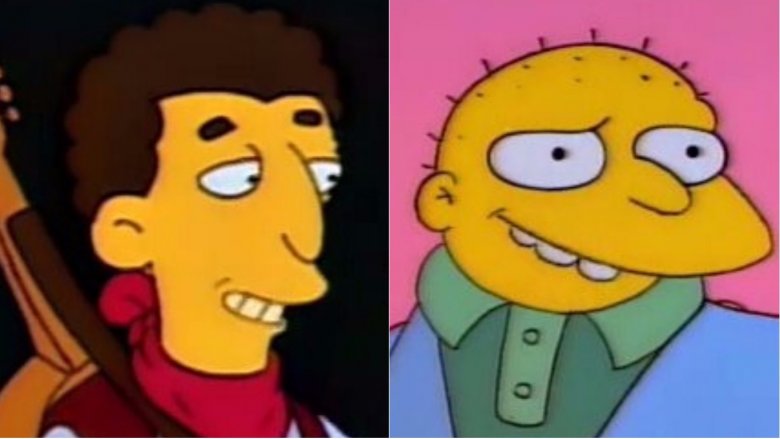Jokes And References You Missed In The Simpsons
Let's be honest: The Simpsons is the greatest TV comedy series of all time, and it's because of the show's fantastic characters, inventive stories, and incredibly fast-paced jokes. Writers and artists cram hundreds of verbal and visual gags into every episode—so many that even the most attentive diehard Simpsons fans can miss one now and then. Here are some of the cleverest jokes and subtle allusions that have been hiding in plain sight on The Simpsons.
Apu's profane college experience
In the 1996 episode "Much Apu About Nothing," viewers learn that Kwik-E-Mart proprietor Apu is an illegal immigrant—he originally came to Springfield on a student visa, but never updated his papers. There's a flashback to Apu's Ph.D. days at his alma mater, Springfield Heights Institute of Technology. That's a perfectly fine name for a college, but when the first letter of each word is used to make an acronym, it forms another word...that can't be uttered on TV.
Sneed's predecessor didn't sell feed and seed
The 1999 episode "E-I-E-I (Annoyed Grunt)" finds the Simpsons fleeing to Grandpa Simpson's old farmhouse in the country so as to avoid a duel with a Southern gentleman. Homer decides to live off the land and grow his own crops, but to so do he needs some supplies, which he gets at a shop called Sneed's Feed & Seed. The store's signage tells us that the place used to be named Chuck's. If that business used the same rhyming name scheme as Sneed's Feed & Seed, it means Chuck's was selling an, ahem, completely different product line.
Mr. Burns, ahoy!
C. Montgomery Burns runs the Springfield Nuclear Power Plant, is the personification of evil, and is incredibly old. How old exactly is never made clear, and that's one of The Simpsons' best and most enduring running jokes. For example, Burns wants to stack his SNPP softball team with early 20th-century pro baseball players, like Cap Anson, Honus Wagner, and a right-fielder that Smithers points out has "been dead for 130 years."
Another indication of Burns' vintage: whenever he answers a telephone, he greets the caller with a hearty "Ahoy-ahoy." Before the logical, natural "hello" took off as the standard call opener in the United States, people said "ahoy"—a derivative of hoi, the Dutch word for "hello." Alexander Graham Bell advocated "ahoy" as the phone greeting of choice shortly after he patented the telephone in the 1870s.
A non-consecutive non sequitur
Grandpa Simpson also seems to be as impossibly old as C. Montgomery Burns...or maybe even older. In the 1996 episode "Two Bad Neighbors," ex-President George Bush moves in across the street from the Simpsons, and Bart drives him nuts. After the boy accidentally destroys the former Commander-in-Chief's memoirs, Bush spanks Bart.
When Homer hears about it, he's livid, but Grandpa Simpson butts in to say that getting spanked by a president is no big deal. "When I was a pup, we got spanked by Presidents 'till the cows came home," he explains. "Grover Cleveland spanked me on two non-consecutive occasions." That's a very strange thing to say, even for Grandpa, who has yelled at clouds and passionately denigrated Missouri. It's really a joking reference to some President Cleveland trivia: like his spankings for young Abe Simpson, Cleveland served his two terms non-consecutively, from 1885 to 1889, and then again from 1893 to 1897.
Paul McCartney's secret soup recipe
When Lisa adopts a vegetarian lifestyle in the 1995 episode "Lisa the Vegetarian," she's encouraged by two of the world's most famous non-meat-eaters: Paul and Linda McCartney. (She meets them on the roof of the Kwik-E-Mart—in Apu's garden, in the shade.) The cute Beatle tells Lisa that if she plays his 1970 hit "Maybe I'm Amazed" backward, she'll discover "a recipe for a really ripping lentil soup."
The joke alludes to the '60s and '70s fad of listening to records backward to find secret messages—specifically how the Beatles' "Strawberry Fields Forever" reportedly features John Lennon uttering "I buried Paul," which led to a rumor/conspiracy theory that McCartney had died and been replaced with an imposter. But the joke doesn't end there: "Maybe I'm Amazed" plays over the end credits of "Lisa the Vegetarian," along with a bunch of weird sounds. That's a backwards track of Paul McCartney reading the recipe for a lentil soup.
The real meaning of 24601
The Simpsons' writers clearly love musical theater. Over the years, the show has given viewers musical versions of A Streetcar Named Desire and Planet of the Apes, a Sideshow Bob episode full of Gilbert and Sullivan tunes, and on the 1994 "Treehouse of Horror" installment, a song about a fog that turns people inside out—a parody of "One" from A Chorus Line.
The show's staff may even have a favorite musical: Les Miserables, the Broadway smash based on the 1862 novel by Victor Hugo. One of the main characters is a former criminal named Jean Valjean. His old prisoner number is 24601—which is also Sideshow Bob's prisoner number, Marge's prisoner number during her brief incarceration, and Principal Skinner's POW number during his hellish years in the Vietnam War.
Why the voice of Angry Dad may look familiar
In the 2002 episode "I Am Furious (Yellow)," a school visit from a cartoonist inspires Bart to make his own comic—"Angry Dad," about a hilariously rage-filled guy who's a not-at-all-veiled version of Bart's own angry dad. A website called BetterThanTV asks Bart to make it into an internet cartoon, and they hire a voice actor to portray the character of Angry Dad. He's not named, but the guy looks exactly like Dan Castellaneta, the real-life actor who has voiced Homer Simpson—Angry Dad's inspiration—for three decades.
A reference that's hard to remember
The 1999 episode "Thirty Minutes Over Tokyo" sends the Simpsons to Japan. Homer isn't keen on the idea at first, but during the plane ride, Marge tells him it'll be fine because he "loved Rashomon." Homer's reply? "That's not how I remember it."
Rashomon is a classic 1950 film by Japanese master director Akira Kurosawa, and it tells the same story several times from multiple viewpoints, suggesting how "the truth" can be subjective. Homer not remembering liking Rashomon, but Marge remembering that he did, is exactly what Rashomon is all about.
Why Smithers can't sit down
Sometimes a Simpsons joke is subtle because it has to be. Network TV shows can't make explicit jokes today, and they really couldn't in 1997, when "My Sister, My Sitter" first aired. While Lisa is babysitting Bart and Maggie, Bart hits his head and knocks himself out. Lisa pops him into a wheelbarrow and takes him to the sleazy but discreet Dr. Nick's Walk-In Clinic. Lisa sees Smithers and asks if she can cut in line because Bart "may be seriously hurt." "Um, no," Smithers replies. "I really would rather get this taken care of." Get what taken care of, exactly? He doesn't say, but that remark, along with the fact that Smithers is standing in front of his chair while everybody else is sitting, suggests that Smithers can't sit down because he's got something...lodged...back there.
There's a complete McBain story arc
While The Simpsons was revolutionizing TV in the early 1990s, action movies dominated at the multiplex. Early in its run, The Simpsons sent up the genre with McBain. Obvious Arnold Schwarzenegger stand-in Rainier Wolfcastle played a cop obsessed with stopping Senator Mendoza, who also ran an international drug cartel. Amazingly, if the first handful of McBain clips are strung together, they tell a complete story.
In the first, the Chief tells McBain to back off Senator Mendoza; next, a Mendoza goon kills McBain's partner. Then the Chief once again tells McBain to leave Mendoza alone and to conduct himself "by the book" (so McBain shoots the book). After that, McBain hides in an ice sculpture to infiltrate Mendoza's launch party for a drug called "Swank" and is knocked out by a gassed salmon puff. Finally, thinking McBain is dead, Mendoza and his associates gather in a board room...only for McBain to break in and kill everyone.
The sweetest Simpsons sign of all time
The Simpsons often makes fun of businesses and public places with hilarious reader boards that appear onscreen for just a second or two. Two standouts: "It Blows: The Air Conditioner Store," and "Springfield Sperm Bank: Put Your Sperm in Our Hands." This sign is probably the most elaborate and subtle of them all (not to mention dark.) Homer drags the clan to the Springfield Community Center for a candy convention, and they're lucky they make it out alive—the sign out front reads "Welcome Candy Convention Room 1! Also Candy-Shaped Rat Poison Convention Room 11."
When the show subtly revealed its secret cameos
In the 1992 episode "Itchy & Scratchy: The Movie," Homer and Marge just can't seem to get Bart to behave. When he goes too far—he steals Homer's car, rams it into a prison, and sets convicts free—Homer bans Bart from ever viewing the highly-anticipated Itchy & Scratchy Movie. Lisa gets to see it, however, and much to Bart's chagrin, she proclaims it "the greatest movie" she's ever seen. She particularly appreciates "the celebrities who did cameos: Dustin Hoffman, Michael Jackson—of course, they didn't use their real names, but you can tell it was them."
Lisa's line is a wry Simpsons reference. Both Dustin Hoffman and Michael Jackson guest-starred on The Simpsons—Hoffman played inspirational teacher Mr. Bergstrom, and Jackson voiced a mental patient named Leon. Just like in the Itchy & Scratchy Movie, neither Hoffman nor Jackson used their real names. Hoffman was billed as "Sam Etic," and Jackson as "John Jay Smith."
